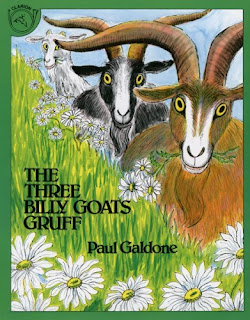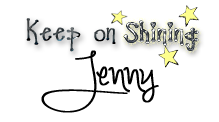In our Shining Star School Family we have been focusing on what it means to be helpful. We have been reading stories and noticing the helpful acts of those around us. We have taken photos of children "caught in the act" of being helpful. Those photos are used to make class books, posters, and routine books that will encourage helpfulness in all children. I am often surprised at how often even a child who is five-years-old doesn't know what it means to "be helpful". We are expecting children to do something they really don't know how to do! That's why we take every opportunity we can to encourage it in our classroom!
This time of year, as we talk about topics such as families, food, and where we live, one of my all time favorite tales to share with children is "The Three Billy Goats Gruff".
Preschoolers are captivated by the various personalities of the characters in the story. (I also think they love the way Ms. Jenny changes her voice for each character) They jump at the opportunity to act out the story using various props and taking their turn at being each character. This year, I jumped for joy when I found the most recent publication of this favorite tale. This new favorite is titled "The Three Billy Goats Fluff".
Oh my goodness! It is absolutely adorable and so very useful in our pursuit to teach the Shining Stars about helpfulness, problem solving, and emotional regulation! The author brilliantly puts a positive twist on this old tale! We followed our reading of Paul Galdone's version of the tale with this new version. The children were familiar with how rude the original troll was and how the billy goats used a very hurtful plan to "handle" the troll. In "Billy Goats Fluff" we learned that with a little problem solving help from their Safekeeper (mom) the billy goats could help the Troll AND find a way to quietly cross the bridge to the grassy hill.
To help illustrate the contrast between the two stories we acted out the "trip trapping" of hooves across the bridge using wooden blocks. We listeded to the blocks on our wooden bridge first without socks. Then we listened to the blocks cross the bridge with fuzzy socks on them. They were so quiet! The children loved making predictions about how the "hooves" would sound. We also used various musical instruments to further impress the difference between loud and quiet. This activity was a great opportunity for us to learn how our voices/noises we make affect those around us.
You'll have to read the whole story to find out more, but one of my favorite lessons from the story is when the first billy goat Fluff feels scared and runs home to Mommy. After reading this portion of the story, we paused to relate this experience to our Feeling Buddies. The message of the Feeling Buddy, Scared, is "find a safekeeper". So we pulled out our Feeling Buddy, Scared, and remembered that message and how helpful it was for the billy goat. With the help of their Safekeeper (mom) the goats were able to come up with a plan that allowed them to eat grass and help the Troll enjoy his "vacation" under the bridge.
This is a sample of what the Feeling Buddies Self-Regulation Center looks like from Conscious Discipline. It is magical to see how well the children relate to the Feeling Buddies as they are learning how to befriend their feelings. I plan to post more about using the Feeling Buddies in the classroom later this year! You might like to check it out at www.consciousdiscipline.com under the product tab.





No comments:
Post a Comment